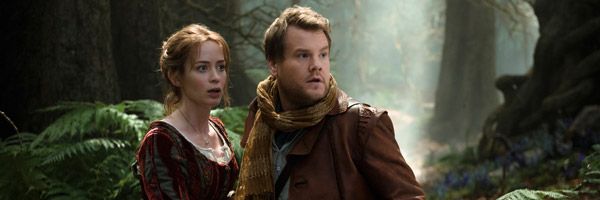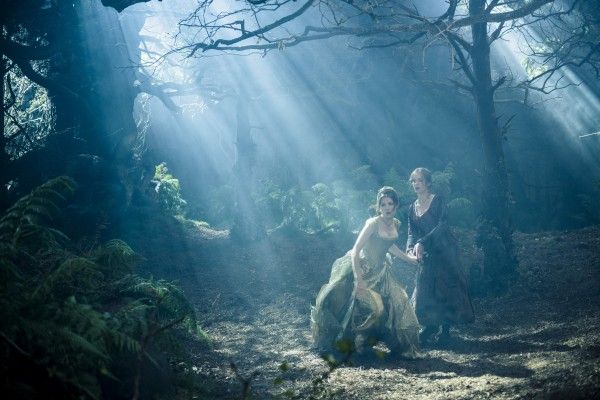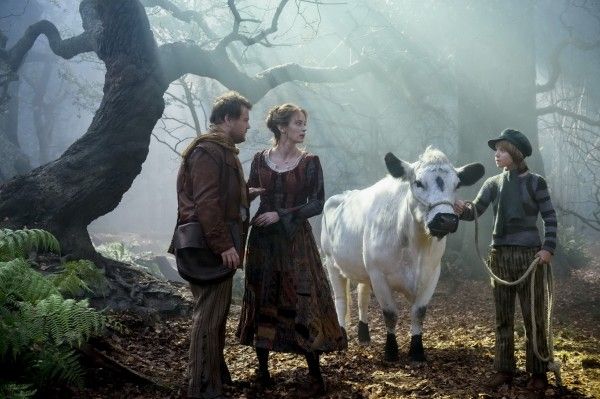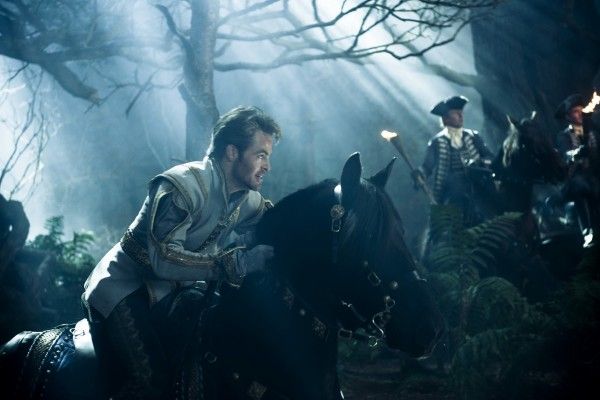Twenty-seven years after Stephen Sondheim and James Lapine’s musical Into the Woods premiered on Broadway, the piece is making its was to the big screen. The story centers on the Baker (James Corden) and his Wife (Emily Blunt) who so desperately want to have a child, but come to realize that they can’t unless they reverse The Witch’s (Meryl Streep) curse. Meanwhile, elsewhere in the kingdom, Cinderella (Anna Kendrick) is busy slaving away for her wicked stepmother (Christine Baranski) while dreaming of attending the King’s festival and dancing before The Prince (Chris Pine).With Into the Woods making its way into theaters on Christmas Day, Corden, Blunt, Pine, Kendrick, Lapine and director Rob Marshall all came to New York City to participate in a press conference. The group discussed the unique layers of the characters, the challenges of making a movie musical, the extensive rehearsal process and loads more. Hit the jump to check it all out.Warning: This interview contains plot spoilers!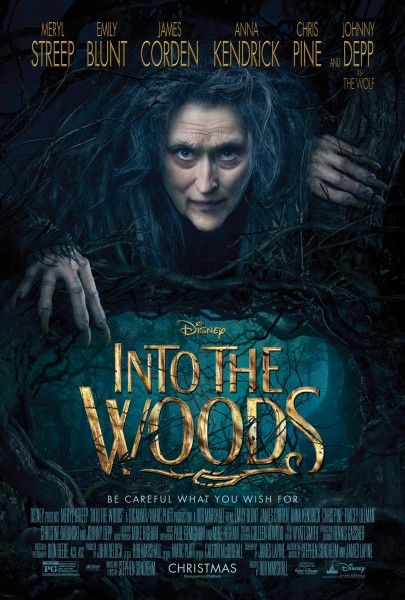 Question: What did you and Stephen Sondheim have in mind when you were originally writing Into the Woods and now with the passing of time, why do you think it remains so resonant with audiences today?JAMES LAPINE: Well, first part’s kind of a hard one to answer ‘cause, you know, we weren’t sure what we were doing. It wasn’t like this was an idea that we had and then started writing. We got together, we’d just shoot the breeze because we wanted to write another show, I’d say, ‘Well, what do you want to do?’ He said, ‘I want to do like a quest journey, you know, like Galahad or The Odyssey or Wizard of Oz.’ I went, ‘Oh, that’s interesting,’ and he said, ‘What do you want to do?’ I said, ‘I want to write a plot,’ because as a writer, I had never really written anything with a lot of plot. So that’s where we started and then I also had a real fascination with fairytales. I’m gonna make this really fast, went off, tried to write an original fairytale, discovered that it wasn’t really very easy because fairytales are really short and then I sort of hit on this idea of combining writing one original fairytale, The Baker and the Wife, and then weaving them together with the existing fairytales, and so that’s how it all kind of went from there. I think the resonance is always a surprise, but I guess fairytales have lasted quite a long time, and I guess our show, because of that, has it at the core, is sort of timeless because people are still reading them and then reading them to their kids. They have a different perspective to them as they get older and there’s always a giant, and [the] giant just keeps changing, so that’s kind of why I think it’s stuck around. Question: Rob, with musicals being so different from all other genres, are they more difficult to direct?ROB MARSHALL: They’re very fragile. I mean, I feel like you’re always this far away from a Saturday Night Live sketch because if the song doesn’t come out of the story in an organic way, in a seamless way, and you feel the number beginning, it’s dangerous because of the fact that somebody’s singing. What’s so beautiful about this amazing piece that James wrote and Steve Sondheim wrote is that the material is so organic. I mean, you said this the other day, James, which I loved, which is if you pull the songs out of the piece, the piece falls apart. You know? There are musicals you can take the songs out and it doesn’t affect it at all. But what’s fantastic about this piece is it’s so interwoven. I mean, you can see that in the first 16 minutes, that opening prologue. It’s so beautifully created and written because it moves in and out of dialogue so seamlessly, but it’s very delicate, creating a musical. I feel like it’s two movies in one when I’m working on it because you have the whole side of the music, etc., and you have the rehearsals and all of that. That’s almost its own thing. Then you have the filming of it and the piece, so it’s a balancing act and the only way you can do it well is if you have great material and brilliant actors.
Question: What did you and Stephen Sondheim have in mind when you were originally writing Into the Woods and now with the passing of time, why do you think it remains so resonant with audiences today?JAMES LAPINE: Well, first part’s kind of a hard one to answer ‘cause, you know, we weren’t sure what we were doing. It wasn’t like this was an idea that we had and then started writing. We got together, we’d just shoot the breeze because we wanted to write another show, I’d say, ‘Well, what do you want to do?’ He said, ‘I want to do like a quest journey, you know, like Galahad or The Odyssey or Wizard of Oz.’ I went, ‘Oh, that’s interesting,’ and he said, ‘What do you want to do?’ I said, ‘I want to write a plot,’ because as a writer, I had never really written anything with a lot of plot. So that’s where we started and then I also had a real fascination with fairytales. I’m gonna make this really fast, went off, tried to write an original fairytale, discovered that it wasn’t really very easy because fairytales are really short and then I sort of hit on this idea of combining writing one original fairytale, The Baker and the Wife, and then weaving them together with the existing fairytales, and so that’s how it all kind of went from there. I think the resonance is always a surprise, but I guess fairytales have lasted quite a long time, and I guess our show, because of that, has it at the core, is sort of timeless because people are still reading them and then reading them to their kids. They have a different perspective to them as they get older and there’s always a giant, and [the] giant just keeps changing, so that’s kind of why I think it’s stuck around. Question: Rob, with musicals being so different from all other genres, are they more difficult to direct?ROB MARSHALL: They’re very fragile. I mean, I feel like you’re always this far away from a Saturday Night Live sketch because if the song doesn’t come out of the story in an organic way, in a seamless way, and you feel the number beginning, it’s dangerous because of the fact that somebody’s singing. What’s so beautiful about this amazing piece that James wrote and Steve Sondheim wrote is that the material is so organic. I mean, you said this the other day, James, which I loved, which is if you pull the songs out of the piece, the piece falls apart. You know? There are musicals you can take the songs out and it doesn’t affect it at all. But what’s fantastic about this piece is it’s so interwoven. I mean, you can see that in the first 16 minutes, that opening prologue. It’s so beautifully created and written because it moves in and out of dialogue so seamlessly, but it’s very delicate, creating a musical. I feel like it’s two movies in one when I’m working on it because you have the whole side of the music, etc., and you have the rehearsals and all of that. That’s almost its own thing. Then you have the filming of it and the piece, so it’s a balancing act and the only way you can do it well is if you have great material and brilliant actors.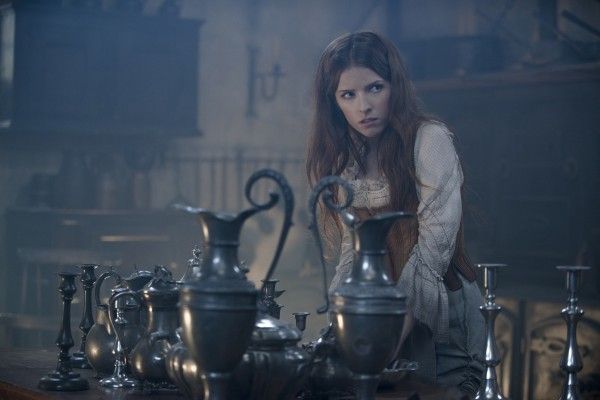 Question: Anna, your Cinderella is certainly not the stereotypical persona of a fairytale character. Is that something that attracted you to the role?ANNA KENDRICK: It’s funny, that question in that exact way has come up several times and it’s not the traditional Cinderella and it’s a fascinating Cinderella, but, you know, it could have been the lamest Cinderella of all time. It’s Rob Marshall and this cast and Sondheim, and so the idea of it attracted me to the role. It’s like it’s just gravy on top of gravy on top of gravy, and Cinderella in this, her defining quality is bravery because she has known nothing but neglect her entire life, and then when she’s presented with a different situation, she overthinks it and she is too logical. She doesn’t listen to her heart. She wants to listen to her head or she wants to try a combination of both and I think that Rob was very interested in having a modern sensibility for these characters and I think that’s a very modern thing that women do is, you know, we cannot listen to our guts. We have to look at everything from every angle and overthink everything, and then for her to allow herself to go into this better situation, realize that it’s completely fake, the prince is so vacuous and it’s all just a façade, and then when she finds herself in a situation where her community is undergoing this great tragedy, it’s then that she can focus and say, ‘This isn’t what I want. I want something real and I don’t know what that is yet, but I’m willing to forego this safe situation to find out what that is, even though right now that’s a handful of survivors and I don’t know what will happen next.’ Question: Chris, everybody’s talking about the line, ‘I was raised to be charming, not sincere.’ How does that inform the character of The Prince?CHRIS PINE: Well, I think it’s a distillation of precisely who the man is. There are a couple characters in this that I think are taken from the pages of the storybook and remain pretty two dimensional even if they’re given the chance to be interesting and complex and relational, and that’s my character, and I think Christine Baranski’s character, the stepmother, and the roles we play are to reflect back. You know, here’s a guy that knows he’s being watched, he knows he is preening, every movement is kind of thought out beforehand. His journey has nothing to do with these other people that he’s so driven to be with, the Baker’s Wife or Cinderella. It’s all about this kind of inner desire to be seen and to play out this story that he’s probably been playing out in generation and generation and generation. He’s just like an LP that keeps on running itself back. And in the one moment that he’s given the opportunity to see what his effect has on Cinderella where she says, ‘Well, look at me. Look what’s happened. You’re a philandering prick.’ He thinks about it for a second. You can see that it does hurt him and he does have a moment of inner reflection but then chooses to get back on the horse and again play out the two dimensional story that he has been playing out for generations. I had a lot of fun playing a guy with big hair and a tan, and just loving himself. It was a joy. [Laughs]Â
Question: Anna, your Cinderella is certainly not the stereotypical persona of a fairytale character. Is that something that attracted you to the role?ANNA KENDRICK: It’s funny, that question in that exact way has come up several times and it’s not the traditional Cinderella and it’s a fascinating Cinderella, but, you know, it could have been the lamest Cinderella of all time. It’s Rob Marshall and this cast and Sondheim, and so the idea of it attracted me to the role. It’s like it’s just gravy on top of gravy on top of gravy, and Cinderella in this, her defining quality is bravery because she has known nothing but neglect her entire life, and then when she’s presented with a different situation, she overthinks it and she is too logical. She doesn’t listen to her heart. She wants to listen to her head or she wants to try a combination of both and I think that Rob was very interested in having a modern sensibility for these characters and I think that’s a very modern thing that women do is, you know, we cannot listen to our guts. We have to look at everything from every angle and overthink everything, and then for her to allow herself to go into this better situation, realize that it’s completely fake, the prince is so vacuous and it’s all just a façade, and then when she finds herself in a situation where her community is undergoing this great tragedy, it’s then that she can focus and say, ‘This isn’t what I want. I want something real and I don’t know what that is yet, but I’m willing to forego this safe situation to find out what that is, even though right now that’s a handful of survivors and I don’t know what will happen next.’ Question: Chris, everybody’s talking about the line, ‘I was raised to be charming, not sincere.’ How does that inform the character of The Prince?CHRIS PINE: Well, I think it’s a distillation of precisely who the man is. There are a couple characters in this that I think are taken from the pages of the storybook and remain pretty two dimensional even if they’re given the chance to be interesting and complex and relational, and that’s my character, and I think Christine Baranski’s character, the stepmother, and the roles we play are to reflect back. You know, here’s a guy that knows he’s being watched, he knows he is preening, every movement is kind of thought out beforehand. His journey has nothing to do with these other people that he’s so driven to be with, the Baker’s Wife or Cinderella. It’s all about this kind of inner desire to be seen and to play out this story that he’s probably been playing out in generation and generation and generation. He’s just like an LP that keeps on running itself back. And in the one moment that he’s given the opportunity to see what his effect has on Cinderella where she says, ‘Well, look at me. Look what’s happened. You’re a philandering prick.’ He thinks about it for a second. You can see that it does hurt him and he does have a moment of inner reflection but then chooses to get back on the horse and again play out the two dimensional story that he has been playing out for generations. I had a lot of fun playing a guy with big hair and a tan, and just loving himself. It was a joy. [Laughs] 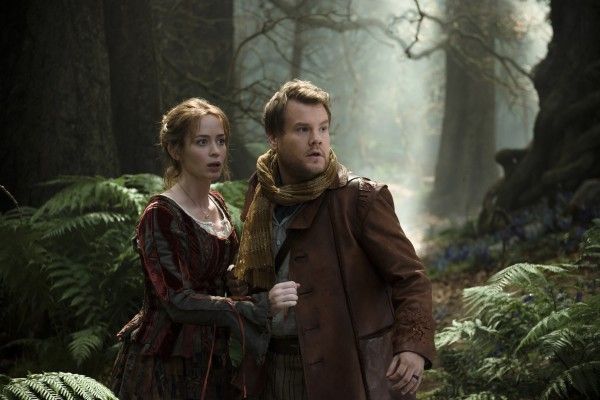 EMILY BLUNT: I actually was thinking Chris Pine was not very well because I was only used to seeing him with a fantastic suntan, so when I saw him yesterday, I was like, ‘My God, Chris looks a bit unwell.’ [Laughs] Question: Emily, wishes come true, not free. How does that affect your character?BLUNT: Well, it probably affects her in the most dramatic and tragic way because she realizes too late that all of the morally questionable things that she’s done to get her wish and this fling she’s just had with The Prince, and how conflicted she is after that, she comes to the realization at the end of that song, “Moments in the Woods,†that what she had is actually what she’s always had, which is this amazing, really profound long lasting relationship with her Baker, is really the thing that she treasures.JAMES CORDEN: Who is handsome.BLUNT: [Laughs] Who is absolutely gorgeous! And why I would go for that, with this, is insane. But it all comes too late, so I think she is the most tragic character, but in a way, the death that becomes her is probably correct in this story in comparison to the other characters because I think she probably is the most questionably moral character in it. It is tragic and it is sad and it’s awful that The Baker is left on his own, and I think James is amazing in that scene after I go. It’s every parent’s worst nightmare, I think, to be left alone and continue, and to be left behind. It’s what you fear. I don’t know if she deserved to die [laughs]. I mean, it’s Prince Charming, you know what I mean? It was like, Rob and I talked about this, it’s like a Midwestern housewife who’s never left her town and reads People Magazine every day and George Clooney knocks on the door and goes, ‘Do you want to make out?’ You know, she would say yes! [Laughs] CORDEN: But you’re already married to Brad Pitt. So yes, you did deserve to die. [Laughter] Question: James, what was it like to walk in the first day and go to work with this cast?CORDEN: Oh, you know, it’s terrifying is what it is. I mean, I said this to Rob actually when we’d been doing it three or four weeks. Day four, I went home to my wife and said, ‘Babe, honestly, I’m being deadly serious, I think I might get fired.’ [Laughs] Because I just thought, really, I just can’t – it’s inconceivable to me that I belong here in this company. This feels a huge mistake. And then what’s amazing about it, and what’s great, is even just the way we talk about it as a company of actors, as opposed to a cast of actors. I’ve never been on something outside of the theater that has felt more ingrained in that sort of world, and that’s down to Rob, it’s down to John DeLuca and it’s down to the five weeks rehearsal we did where we’d sit in a rehearsal room and we rehearsed the whole film. We rehearsed every single second of the movie and there were points where, you know, we were rehearsing in an empty space with like sticks as trees and cardboard boxes as rocks and things and you would have thought we were rehearsing like a touring production of Into the Woods and we were going to take it on the road.Â
EMILY BLUNT: I actually was thinking Chris Pine was not very well because I was only used to seeing him with a fantastic suntan, so when I saw him yesterday, I was like, ‘My God, Chris looks a bit unwell.’ [Laughs] Question: Emily, wishes come true, not free. How does that affect your character?BLUNT: Well, it probably affects her in the most dramatic and tragic way because she realizes too late that all of the morally questionable things that she’s done to get her wish and this fling she’s just had with The Prince, and how conflicted she is after that, she comes to the realization at the end of that song, “Moments in the Woods,†that what she had is actually what she’s always had, which is this amazing, really profound long lasting relationship with her Baker, is really the thing that she treasures.JAMES CORDEN: Who is handsome.BLUNT: [Laughs] Who is absolutely gorgeous! And why I would go for that, with this, is insane. But it all comes too late, so I think she is the most tragic character, but in a way, the death that becomes her is probably correct in this story in comparison to the other characters because I think she probably is the most questionably moral character in it. It is tragic and it is sad and it’s awful that The Baker is left on his own, and I think James is amazing in that scene after I go. It’s every parent’s worst nightmare, I think, to be left alone and continue, and to be left behind. It’s what you fear. I don’t know if she deserved to die [laughs]. I mean, it’s Prince Charming, you know what I mean? It was like, Rob and I talked about this, it’s like a Midwestern housewife who’s never left her town and reads People Magazine every day and George Clooney knocks on the door and goes, ‘Do you want to make out?’ You know, she would say yes! [Laughs] CORDEN: But you’re already married to Brad Pitt. So yes, you did deserve to die. [Laughter] Question: James, what was it like to walk in the first day and go to work with this cast?CORDEN: Oh, you know, it’s terrifying is what it is. I mean, I said this to Rob actually when we’d been doing it three or four weeks. Day four, I went home to my wife and said, ‘Babe, honestly, I’m being deadly serious, I think I might get fired.’ [Laughs] Because I just thought, really, I just can’t – it’s inconceivable to me that I belong here in this company. This feels a huge mistake. And then what’s amazing about it, and what’s great, is even just the way we talk about it as a company of actors, as opposed to a cast of actors. I’ve never been on something outside of the theater that has felt more ingrained in that sort of world, and that’s down to Rob, it’s down to John DeLuca and it’s down to the five weeks rehearsal we did where we’d sit in a rehearsal room and we rehearsed the whole film. We rehearsed every single second of the movie and there were points where, you know, we were rehearsing in an empty space with like sticks as trees and cardboard boxes as rocks and things and you would have thought we were rehearsing like a touring production of Into the Woods and we were going to take it on the road. 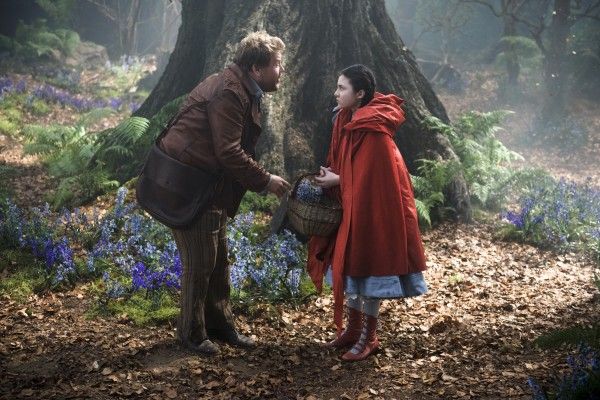 BLUNT: Which we will. [Laughter] CORDEN: Yeah, we just so happen to have Meryl Streep in it and we – and she’s the reason actually, is the truth, she’s the thing that puts you at ease because she leads from the front and she knows how you feel when she walks in the room and she does everything she can to put you at ease and make you feel like we are all a company of actors who will get the best out of this experience if we support each other. And I think it shines through in the film that this is a company of people where no one is trying to steal the limelight or the movie from anyone else. It’s a group of actors, friends really, all going, ‘No, no, go and be brilliant. Go and be amazing.’ And that really comes from Rob and it trickles down through Meryl right to the bottom, and just below that, you’ll find me. [Laughter]Question: One of the big surprises for moviegoers is to find out, except for Anna Kendrick, that the actors are singing here. I would love it if I could hear from you guys what it was like to know that you’re going to go into a musical and how you prepared and if any of you said to Rob, ‘Maybe we should have somebody come and dub me or anything.’ And James, you’ve got this wonderful thing with The Late Late Show that you’re starting in March, I guess. Was that any kind of big debate within yourself, with your family, about moving to New York and doing this?CORDEN: About doing the Late Late Show? Yeah. I mean, there was a huge amount of back and forth and reticence about whether this was – you know, the truth is that the pros far outweigh the cons in a situation like that, but the cons are deeply profound, which is I love acting, I love it every day and I love writing and I love my career up to this point, and I came to the conclusion that really, who am I to turn it down? This is an opportunity that doesn’t come round again and it’s come my way, ridiculously so. I mean, it’s gonna be a disaster, you understand, right? I mean, it’s gonna be awful. It’s gonna be like when you see a car crash on the other side of the freeway. You’re gonna want to watch it for a little bit and then go, ‘Jeez, that was a mistake. I’m glad that wasn’t me.’ Predominantly, it’s interesting, you talk about it as a life decision, and you know, I have a son who’s three and my daughter is 21 days old, and here is an opportunity and a situation where someone has offered an opportunity to me to be a present dad and a husband is the truth, where I will get to be around and be around my children when they grow up and be around my wife, and that’s not always the case. You don’t always have that luxury in this job. You’re off to New Zealand to wherever the new tax break in the world is to shoot something and sometimes you have to do that. And ultimately I thought, well, who am I to pass up this opportunity to be able to talk to America every night and maybe just try and make them smile, dare I say it, laugh, just before or more likely during the time when they fall asleep. And I will try my absolute best to provide something that is warm and fun, like our film is … Emily, tell us about your amazing singing. BLUNT: Well, Rob will agree with this. I was very reluctant to audition for this, and he did audition all of us, as he should. CORDEN: Meryl had three call backs. [Laughter]
BLUNT: Which we will. [Laughter] CORDEN: Yeah, we just so happen to have Meryl Streep in it and we – and she’s the reason actually, is the truth, she’s the thing that puts you at ease because she leads from the front and she knows how you feel when she walks in the room and she does everything she can to put you at ease and make you feel like we are all a company of actors who will get the best out of this experience if we support each other. And I think it shines through in the film that this is a company of people where no one is trying to steal the limelight or the movie from anyone else. It’s a group of actors, friends really, all going, ‘No, no, go and be brilliant. Go and be amazing.’ And that really comes from Rob and it trickles down through Meryl right to the bottom, and just below that, you’ll find me. [Laughter]Question: One of the big surprises for moviegoers is to find out, except for Anna Kendrick, that the actors are singing here. I would love it if I could hear from you guys what it was like to know that you’re going to go into a musical and how you prepared and if any of you said to Rob, ‘Maybe we should have somebody come and dub me or anything.’ And James, you’ve got this wonderful thing with The Late Late Show that you’re starting in March, I guess. Was that any kind of big debate within yourself, with your family, about moving to New York and doing this?CORDEN: About doing the Late Late Show? Yeah. I mean, there was a huge amount of back and forth and reticence about whether this was – you know, the truth is that the pros far outweigh the cons in a situation like that, but the cons are deeply profound, which is I love acting, I love it every day and I love writing and I love my career up to this point, and I came to the conclusion that really, who am I to turn it down? This is an opportunity that doesn’t come round again and it’s come my way, ridiculously so. I mean, it’s gonna be a disaster, you understand, right? I mean, it’s gonna be awful. It’s gonna be like when you see a car crash on the other side of the freeway. You’re gonna want to watch it for a little bit and then go, ‘Jeez, that was a mistake. I’m glad that wasn’t me.’ Predominantly, it’s interesting, you talk about it as a life decision, and you know, I have a son who’s three and my daughter is 21 days old, and here is an opportunity and a situation where someone has offered an opportunity to me to be a present dad and a husband is the truth, where I will get to be around and be around my children when they grow up and be around my wife, and that’s not always the case. You don’t always have that luxury in this job. You’re off to New Zealand to wherever the new tax break in the world is to shoot something and sometimes you have to do that. And ultimately I thought, well, who am I to pass up this opportunity to be able to talk to America every night and maybe just try and make them smile, dare I say it, laugh, just before or more likely during the time when they fall asleep. And I will try my absolute best to provide something that is warm and fun, like our film is … Emily, tell us about your amazing singing. BLUNT: Well, Rob will agree with this. I was very reluctant to audition for this, and he did audition all of us, as he should. CORDEN: Meryl had three call backs. [Laughter]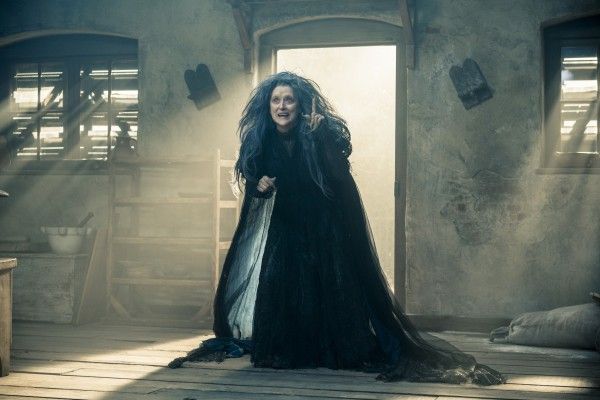 BLUNT: We really didn’t know if she was gonna get it or Nicki Minaj. She did a great audition. So I was scared to go in, and it was Rob who called after. I think I said I didn’t want to audition at first and he called my agent and he said, ‘She’s coming in.’ And he said, ‘I want actors who can kind of sing, not the other way around.’ And I was like, okay. So I had a couple of singing lessons and I learned it and I went in and just like everybody else, I auditioned and he was amazing and gave it to me, and I’m grateful, very grateful. It’s the best part I’ve ever been given actually, so once I got over my own fear of singing in front of other people, it turned out to be such an exhilarating and impassioned sort of experience, and joyful, more than anything. You realize how joyful it is to sing and to be around music. The day we sang with a 65 piece orchestra with Stephen Sondheim in the next room, it’s just one of those days you will never, ever forget, ever.PINE: I was the only person I think that didn’t know what Into the Woods was, so my agent called me, he said, ‘Do you want to audition for the Into the Woods musical?’ I said, ‘That’s great.’ BLUNT: I didn’t know either. PINE: Meryl Streep and Rob Marshall, I was like, ‘Yeah! Count me in!’ And I had a night to prepare a song to go sing in Rob Marshall’s living room and then I made the mistake of going online and Googling what I was getting into and then it dawned on me the kind of magnitude and the pantheon that I was touching with this music. But Rob and John, they’re lovely in that they come from theater so they understand – cinema is a visual medium, as is theater, but theater, I feel like the directors in theater, they understand because you spend so much time with us poor, vulnerable actors before we get on stage that you understand how much warmth you need and booing, you know? And so to step into that living room having not sung for anyone but myself and my soap dish was terrifying, but he was lovely and we spent a lot of time talking about singing, what it might be like and then the piano was brought out and then he and John joined me, I think, in singing, and we had great fun. And to Emily’s point, it’s like it is just a blast, and that’s what I remember seeing on Meryl’s face is that, above and beyond anything, it is hard work and Sondheim is very technical, but it’s a great joy, and to remember that what we do is joyful, it was a great thing.
BLUNT: We really didn’t know if she was gonna get it or Nicki Minaj. She did a great audition. So I was scared to go in, and it was Rob who called after. I think I said I didn’t want to audition at first and he called my agent and he said, ‘She’s coming in.’ And he said, ‘I want actors who can kind of sing, not the other way around.’ And I was like, okay. So I had a couple of singing lessons and I learned it and I went in and just like everybody else, I auditioned and he was amazing and gave it to me, and I’m grateful, very grateful. It’s the best part I’ve ever been given actually, so once I got over my own fear of singing in front of other people, it turned out to be such an exhilarating and impassioned sort of experience, and joyful, more than anything. You realize how joyful it is to sing and to be around music. The day we sang with a 65 piece orchestra with Stephen Sondheim in the next room, it’s just one of those days you will never, ever forget, ever.PINE: I was the only person I think that didn’t know what Into the Woods was, so my agent called me, he said, ‘Do you want to audition for the Into the Woods musical?’ I said, ‘That’s great.’ BLUNT: I didn’t know either. PINE: Meryl Streep and Rob Marshall, I was like, ‘Yeah! Count me in!’ And I had a night to prepare a song to go sing in Rob Marshall’s living room and then I made the mistake of going online and Googling what I was getting into and then it dawned on me the kind of magnitude and the pantheon that I was touching with this music. But Rob and John, they’re lovely in that they come from theater so they understand – cinema is a visual medium, as is theater, but theater, I feel like the directors in theater, they understand because you spend so much time with us poor, vulnerable actors before we get on stage that you understand how much warmth you need and booing, you know? And so to step into that living room having not sung for anyone but myself and my soap dish was terrifying, but he was lovely and we spent a lot of time talking about singing, what it might be like and then the piano was brought out and then he and John joined me, I think, in singing, and we had great fun. And to Emily’s point, it’s like it is just a blast, and that’s what I remember seeing on Meryl’s face is that, above and beyond anything, it is hard work and Sondheim is very technical, but it’s a great joy, and to remember that what we do is joyful, it was a great thing.
continue reading on Page 2
Question: Emily and Anna, do you get princess fever? If you could play any Disney princess, who would you like to play? And also to the director, this casting is totally amazing with award-winners and newcomers all together. What were the difficulties you faced during casting?
MARSHALL: For me, what I was looking for was actors that have deep humanity, that you feel for, that you care for, that have humor and have depth and fragility, which makes you understand and root for these people. And one of my favorite things about this piece is that it begins with everyone wanting something desperately. I wish, I wish, I wish. And it’s a beautiful thing. When you have that, it’s all these underdogs. They all are hoping for something that they can achieve and if you don’t get on board with them and love them - and this is every character including the witch and, you know, everybody you should be feeling for, and I was so lucky to put together this amazing cast. You can see; these are great people in addition to being great actors, and I was in heaven every day working with this extraordinary cast. I think we were all scared when we started. It’s an incredibly beautiful piece and we all wanted to do it a great service, but I think we all sort of just grabbed hands together and jumped in, and it felt playful. That time in rehearsal where you create a company is a very special time, because it’s in that time that we all feel we’re doing the same film. And so when you get to filming, we had a very tight schedule and a very tight budget, we were moving quickly, but we knew what we were doing. I felt like we were ready and so when we got there on the day we were able to actually start filming immediately. But it was because everybody was working together, and it’s ironic because that’s what the piece is about, it’s about the community coming together, this beautiful family that’s created in the end, it’s about moving forward together with the song “No One Is Alone,†which is really the central theme of the piece, and I felt that was happening while we were making the film as well.
Question: And the princess that would you like to be?
BLUNT: I would be Princess Jasmine because I’ve always wanted a pet tiger. I’m gonna go for that, Anna. I’m sorry I chimed in. If you were gonna be Jasmine, I apologize.Â
KENDRICK: No, I was gonna go Ariel because I get a pet flounder and crab. [Laughter]Â
Question: Rob, I wanted to ask you about working with Dion Beebe again. Memoirs of a Geisha, Chicago - how did you approach putting this together? It’s a stage production. What was the particular challenge and how did you approach putting it on screen?
MARSHALL: I love talking about Dion. We all love talking about Dion because if you walk onto the set, the last person you would imagine as the director of photograph is Dion Beebe because he’s so quiet and so humble and he’s just an artist. I think he’s a painter of motion and light, and that’s how I feel. He understands the fluidity of camera movement, he understands the beauty of light, but he also understands we were creating a fantasy world but not a two dimensional fantasy world. It had to have some truth to it because they’re real people in this, like I said before, that you need to care about. And I have such a shorthand with him because of the work we’ve done before. It was very important, actually, for me to have him on this film because we were moving quickly. And Colleen Atwood as well, another longtime collaborator of mine, because she understands how we work. It’s just a full-on collaboration is what it is, I mean, with him. He knows what I’m about to say before I say it and I know what he’s gonna say before we say it. We’re moving like that together. It’s a beautiful partnership.
Question: How important was it that your cast members had backgrounds in theater? Because everybody in this movie has done theater. Was that a major point in the casting, whether they’ve done musicals or not?
MARSHALL: It wasn’t intentional, but in an odd way it made sense once it was put together because everyone had that discipline, which is a big part of it, I have to say. You know, the discipline of theater is where you learn the chops. These people have real chops, these actors, and also understand the idea of an ensemble piece. That’s something that only comes with a company and that comes in theater. It’s rare to see that. I mean, listen, I’ve been very lucky in my career to be able to work with amazing actors but this was very special because it felt like a company. You know, the great thing about the theater training is that every single person at this beautiful table here has an unbelievable range, and that’s what I love about this company. They’re all so funny and they also have such great depth as actors, too, and feeling, and that comes from real chops and you get that in a theater, that’s for sure.
Question: Anna and Chris, a bunch of us grew up on Disney fairytales, but how do you guys think that these stories apply, or maybe they don’t apply, to the craziness of modern day dating?
[Laughter]
CORDEN: Nice question. Tinder.Â
Journalist: Tinderella.
CORDEN: Tinderella! That’s a hashtag! Put it out there now! Â
KENDRICK: James, shut it! [Laughter] Oh, boy. I’ve got to get in front of this story. Someone give me my phone! [Laughter] I understand that’s sort of a half serious question, but, to be honest, I think that this has something very mature and modern to say about separation. When Cinderella and The Prince, they have this conversation and a lot of people, you know, they’re like, ‘This isn’t your everyday Cinderella and she kicks him to the curb,’ and while that’s sort of true, the fact that it’s done with so much civility and compassion I think - my parents set an amazing example for me because they divorced when I was 15 and we’re having Thanksgiving dinner together in a couple of days. And I know that that’s not always the case, but I think that that scene meant so much to me because I feel love for people that I have loved and I think that’s so beautiful and I think that’s such an important lesson for children that, you know, people can have disagreements but it doesn’t mean one is bad and one is good. I feel so grateful to my family for setting this amazing example within separation and I hope that that scene is a reflection of that.Â
CORDEN: Chris, would you swipe left or right on Tinder? If Anna came up on Tinder, would you swipe left or right?Â
PINE: Umm …Â
CORDEN: Left or right!Â
PINE: [Laughs] I think that …
CORDEN: Chris Pine doesn’t need Tinder, that’s what we’re realizing. Life is Tinder for Chris Pine. He literally steps out of his door into a virtual Tinder. That’s every day.Â
PINE: You know, I think obviously we tell each other stories in life and as storytellers that’s what we do. We tell each other stories so we can understand the world better and there’s catharsis and we understand the models of what a hero could be and what the hero’s journey as a human being is all about. But unfortunately, I think sometimes those stories too can be very prohibitive and confining, and this idea that we, especially in Western culture, Western literature, Tristan and Isolde, and Romeo and Juliet, that there’s some kind of all-encompassing burning passionate love that will never die out unless you both die. It is so depressing and not real. And that these two people, The Prince living out this storybook life all the time in a completely non-relational manner with a woman that he’s apparently in love with, I think it’s very telling that this relationship, there’s not one conversation until the last moment where they break up. I mean, if you look at the film it’s just these little eighth page things of looking up gazingly, fervently at one another, and it doesn’t mean anything, and I think the beautiful thing about it is that here’s a woman that chooses to get out of the story of Romeo and Juliet and Tristan and Isolde. It’s like, ‘Check it out. I don’t want you because you’re lame and you don’t listen to me.’ But actually in that final moment he does listen and I think it’s very telling for The Prince that he says, ‘Is this what you want?’ He’s being very respectful and the boundaries are very clear.Â
KENDRICK: It’s the first time he asks anyone a question in the whole movie.Â
PINE: Yeah. But I think there’s this trope in literature that somehow we’re not whole unless we have another, which I don’t think is – personally for me - I think it’s not fair to the uniqueness and wonderfulness of the individuals, that we can complement one another greatly, but we are not the source of each other’s happiness, especially if you don’t know who the hell you’re talking to.

